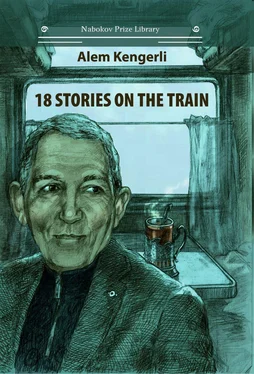Alem Kengerli - 18 Stories on the Train
Здесь есть возможность читать онлайн «Alem Kengerli - 18 Stories on the Train» — ознакомительный отрывок электронной книги совершенно бесплатно, а после прочтения отрывка купить полную версию. В некоторых случаях можно слушать аудио, скачать через торрент в формате fb2 и присутствует краткое содержание. Город: Moscow, Год выпуска: 2021, ISBN: 2021, Жанр: russian_contemporary, на английском языке. Описание произведения, (предисловие) а так же отзывы посетителей доступны на портале библиотеки ЛибКат.
- Название:18 Stories on the Train
- Автор:
- Жанр:
- Год:2021
- Город:Moscow
- ISBN:978-5-907395-42-8
- Рейтинг книги:3 / 5. Голосов: 1
-
Избранное:Добавить в избранное
- Отзывы:
-
Ваша оценка:
- 60
- 1
- 2
- 3
- 4
- 5
18 Stories on the Train: краткое содержание, описание и аннотация
Предлагаем к чтению аннотацию, описание, краткое содержание или предисловие (зависит от того, что написал сам автор книги «18 Stories on the Train»). Если вы не нашли необходимую информацию о книге — напишите в комментариях, мы постараемся отыскать её.
В формате PDF A4 сохранен издательский макет книги.
18 Stories on the Train — читать онлайн ознакомительный отрывок
Ниже представлен текст книги, разбитый по страницам. Система сохранения места последней прочитанной страницы, позволяет с удобством читать онлайн бесплатно книгу «18 Stories on the Train», без необходимости каждый раз заново искать на чём Вы остановились. Поставьте закладку, и сможете в любой момент перейти на страницу, на которой закончили чтение.
Интервал:
Закладка:
The next day, Kenul waited for Tale for a long time, but he never came. He did not appear on other days either.
She waited for many days. Every time the door opened, she hoped it was him. These expectations were exhausting for Kenul, but at the same time, they brought some meaning to her monotonous and dull life.
She lived in the hope that one morning at nine o'clock, Tale would open this door and embrace his Kenul with a smile on his face.
2
The rain seemed to have gained force. The raindrops were beating hard against the glass. When you go out on a long journey, for some reason you feel yourself in a foreign land. My next hero is Safar. Following a friend’s advice, he went to work in Ukraine many years ago. He thought he would make some money and then come back to his native land, to his family. It turned out differently, though. He wanted to earn more and more. While there, he married a woman named Larissa. They had two children. But over the years, Safar began to understand that the second wife and children did not correspond to his mental considerations, were alien to him, so to speak. He began to be tortured by longing for his relatives, whom he left in his homeland.
This is how he understood that he had to make a final decision.
In a Foreign Land
It seemed to be an ordinary day, but for Safar, it was to be not quite an ordinary one and it became clear from the very morning. He woke up earlier than usual, went into the kitchen, poured himself a glass of yesterday’s tea, and plunged into his thoughts. When he came to Ukraine, encouraged by his childhood friend Kerim, he was a young, healthy and handsome guy. Years have passed since then. He has grown old. There was not a trace left of his former enthusiasm.
Lately, he has been thinking only about one thing: how will his future fate be? Previously, he could serve himself: pour some tea, cook a dinner, even wash his dirty laundry. Today he is not the same he was before. The years took away a lot from him, and most importantly, his youth. Worries and problems lay on his shoulders now. Longing for his homeland, concern over the future of his children born to Larisa…
He was confused.
The daughter Marina, after graduating from high school, left Kharkov for Kiev with her classmate Zakhar. And when the guy was drafted into the army, she went to live with Vadim, who was renting a room in a hostel. Her father's words, telling her that she should not do this and that it was a shame had no effect. The young couple was not married officially, but Marina gave birth to a daughter named Vera. The girl was already two years old. And his son Ilya lived with his parents. He was already 30 years old, but he didn't even think about getting married.
When Ilya was born, Safar was very happy that his firstborn was a boy. But when it was time to give the child a name, he and his wife had a disagreement, which upset him very much. Safar wanted to name his son Veli, which was his father's name. But Larisa began to object.
“What kind of name is that – Veli? I don’t like it.”
And she named the child Ilya. Although he was upset, Safar then thought that this name was somehow consonant with the name Ilyas, that reminded him of his late uncle. He began to console himself with this.
Ilya spent his free time drinking with friends. He led a carefree life of a single man and did not take his father's advice seriously. He changed many jobs due to not being serious about it. Although he loved his father, it was not part of his nature to take care of him. He did not even take care of himself, let alone his father. He slept and ate whenever he could and didn’t think about today or tomorrow. Often he would not come home. He stayed with his friends until late hours and slept wherever he could. Safar did not manage to raise his son the way he would have liked to, although he tried very hard. It looks like the environment and entourage in which the guy grew up played an important role in the formation of Ilya.
Now, in his declining years, Safar was full of problems. This is the law of life: in advanced age, a person often remembers the past years. He was haunted by the longing for his homeland and for his former family, which he once left in his homeland. He was tormented by an irrepressible desire to be close to his family and friends, with whom he parted through his own fault. At the same time, he could not find the strength to return to his homeland, although he was thinking about it day and night. A long time ago, he left his wife there with two young daughters for the care of his parents and left under the pretext of finding a job. He came to Kharkiv and never returned. He blamed himself: “I should not have left my family.” But at the same time, he knew that a late remorse was of no use and so he rushed about in despair.
His present condition was not an easy one. He was thinking about what he could say to his ex-wife, who raised two daughters with great difficulty, dressing them in rags left by relatives and neighbors and feeding her loved ones with leftovers. How will he introduce himself to his children, who did not know him by sight, and who, through his fault, grew up without knowing their father's affection? How will he look into the eyes of his old sick mother who raised him, serving in other people's homes, and who was waiting in vain for her ungrateful son? After all, she was pretty weak now and almost never got out of bed.
Will his conscience allow him to visit the grave of his father, who perished, having drowned himself in the sense of longing for his prodigal son?
Will he be able to stroke the gray hair and heal the wounds of his only sister Zuleikha, who raised him together with his mother?
He did not know that. He only knew that he could not live far from his homeland anymore. He felt abandoned and alone in a foreign land.
Lately, he has also suffered a lot from insomnia. Homesickness robbed him of sleep.
“Why didn't the curse of my daughters, abandoned to the mercy of fate, strike me?” he thought to himself and groaned. “I am getting along somehow, but what will I do in five years from now? After all, here people keep away from each other, they are indifferent to the problems of others. Maybe I should commit suicide and free everyone from me before becoming bedridden?” it occurred to him suddenly. And then immediately drove this thought away. “Where will I be buried if I die?
And what will happen next? Who will visit my grave?… God knows where they will bury me. Surely, my wife and children will drink after my funeral and will party a lot.”
Safar has been thinking about himself for hours. He thought: could it be that after death Allah would forgive him his sins and allow his prodigal soul to return to his home and rest in his native land? Over time, he became more and more convinced that he could not live in places where elders were not honored. What could he expect from strangers when your own children did not give a damn and could not care less about you?
Actually, homesickness haunted Safar for five years already. During these years, there was not a day that he did not think how to escape from suffering and live in peace. He was paying for his mistake that he committed in his youth. After much reflection, Safar came to the conclusion that today was the best day to make the final decision. He had to return to his homeland today. His wife Larisa was not at home. She was with Lyudmila, her friend. This came in handy.
He took a paper, a pen, and began writing a letter to his daughter Marina: “My dear Masha! I am leaving for my homeland. Forever. I feel that I don’t have much time left. It is better for me to die in my native land, among my loved ones. I wish you happiness. Try to save your family this time. Daughter, never change husbands like gloves. Nothing good will come of it. S. W. K. Your father!"
Читать дальшеИнтервал:
Закладка:
Похожие книги на «18 Stories on the Train»
Представляем Вашему вниманию похожие книги на «18 Stories on the Train» списком для выбора. Мы отобрали схожую по названию и смыслу литературу в надежде предоставить читателям больше вариантов отыскать новые, интересные, ещё непрочитанные произведения.
Обсуждение, отзывы о книге «18 Stories on the Train» и просто собственные мнения читателей. Оставьте ваши комментарии, напишите, что Вы думаете о произведении, его смысле или главных героях. Укажите что конкретно понравилось, а что нет, и почему Вы так считаете.












